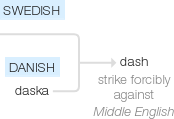Dash
Middle English (in the sense ‘strike forcibly against’): probably symbolic of forceful movement and related to Swedish and Danish daska .
wiktionary
From Middle English daschen, dassen, from Danish daske(“to slap, strike”), related to Swedish daska(“to smack, slap, spank”), of obscure origin. Compare German tatschen(“to grope, paw”), Old English dwǣsċan(“to quell, put out, destroy, extinguish”). See also adwesch, dush.
etymonline
dash (v.)
c. 1300, "strike suddenly and violently," also "move quickly, rush violently," and, transitive, "cause to strike suddenly and violently;" probably from a Scandinavian source (compare Swedish daska, Danish daske "to beat, strike"), somehow imitative. The oldest sense is that in dash to pieces and dashed hopes. Meaning "scatter or sprinkle" (something, over something else) is by 1520s. Intransitive meaning "write or sketch hurriedly" is by 1726 in dash off. By 1800 as a euphemism for damn. Related: Dashed; dashing.
dash (n.)
late 14c., "a violent striking together of two bodies," from dash (v.). In writing and printing, "horizontal line used as a punctuation mark," 1550s. Meaning "small infusion or mixture" is from 1610s. Meaning "showy appearance" is from 1715; sense of "capacity for prompt action" is by 1796. As one of the two Morse code signals from 1859. Sporting sense is from 1881, originally "a short race run in one attempt, not in heats."
